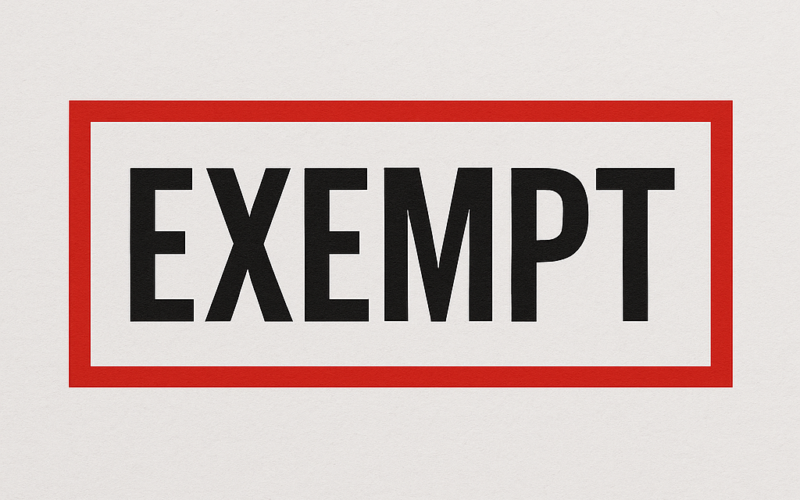Malte Exempt Person Status gives non-EU nationals a legal way to stay in the country when they can’t apply through the usual visa or residency routes. It’s meant for people facing serious or exceptional situations, like health problems, family reasons, or unsafe conditions in their home country.
This status is granted by Identité Malte and is looked at on a case-by-case basis. It’s not permanent, but it gives people who are in a vulnerable position the chance to stay in Malta legally when no other option fits.
Who Can Apply for Exempt Person Status?

The Exempt Person Status is designed for people who are not eligible for asylum or humanitarian protection under international law but still have strong reasons to remain in Malta. Common applicant categories include:
- Persons whose return would be unsafe or unjust (e.g., due to conflict, domestic violence, or statelessness).
- Foreign nationals who developed long-term ties to Malta (e.g., children in school, partners, or dependents of residents).
- Individuals with serious medical conditions that cannot be treated in their home country.
- Former visa holders who became undocumented due to delays, exploitation, or abuse.
Applicants often apply with legal or NGO support, though it is not a requirement. Many applicants rely on assistance from local charities, social workers, or immigration lawyers to prepare their files, especially when documentation is scarce or fragmented.
How to Apply Through Identità Malta
The application process for Exempt Person Status depends on the reason you are applying and your relationship to a Maltese citizen.
Online Application – Available for Family Members of Maltese Citizens
If you are a non-EU national who is the spouse, registered partner, or dependent child (under 21 years of age) of a Maltese citizen, you may submit your application online through Identità Malta’s Portail des expatriés
This route is also available to widows or widowers of Maltese citizens. Required documents typically include:
- A valid passport or travel document
- Birth or marriage certificate
- Proof of relationship with the Maltese citizen
- Evidence of residency in Malta
Once submitted, your application will be reviewed digitally, and you’ll be contacted for any further documentation or interviews if necessary.
Source: Identità Malta Expatriates Portal – Exempt Person Status

In-Person Application – For Other Humanitarian or Exceptional Grounds
If you do pas fall into the categories above, for example, if you’re applying based on humanitarian reasons, medical conditions, statelessness, or long-term ties to Malta – you must submit your application in person à Identità Malta’s Specific Residence Authorisation Unit.
Your application should include:
- Any supporting evidence (e.g., medical reports, social worker letters, police documentation)
- A signed cover letter explaining your situation
- Identification documents, even if expired
⚠️ Note: These applications are reviewed on a case-by-case basis, and an interview may be required depending on the situation.
Application Costs and Exemptions
Submitting the initial request for Exempt Person Status directly to Identità Malta’s Specific Residence Authorisation Unit in writing is gratuit. However, most applicants now apply online through the Expatriates Unit portal, where payment of a non-refundable administrative fee of €25 is required at the time of application submission. This fee covers the issuance of the Exempt Person e-Residence card, which is valid for one year or part thereof.
Certain categories, including spouses of Maltese nationals, individuals granted protection status, and persons released from detention, are exempt from paying this fee.
If the e-Residence card is lost, stolen, or damaged, replacement fees apply—typically between €20 et €22 for lost or destroyed cards and €15 à €16.50 for defaced cards. While there is no cost to renew the application itself, a re-issuance fee for the new e-Residence card must be paid annually if the status is extended. This payment structure ensures applicants maintain their legal status with the appropriate documentation throughout their stay in Malta.
Duration, Renewal, and Work Rights
If granted, the Exempt Person residence card is typically issued for a one-year duration and can be renewed subject to continued justification. Renewal requires submitting a new application with updated documentation for review (the same costs apply). Holders of this status are legally permitted to work in Malta; however, they must apply for an employment licence through Jobsplus, Malta’s employment agency. Employers need to sponsor the role, and the job must comply with national employment standards. This status supports individuals in transitioning from irregular work to formal employment.
A Lifeline of Legal Stay for Exceptional Circumstances
The Exempt Person Status is not a well-known path, but for the right applicants, it provides a legal and humanitarian lifeline in Malta. Though difficult to obtain, this status recognises the need for compassionate immigration solutions in complex or vulnerable situations. With limited visibility and a high bar for approval, strong documentation and professional support are essential to a successful outcome.
If you believe you may be eligible, or you are assisting someone who is undocumented and vulnerable, it is advisable to seek guidance from local advocacy organisations or immigration specialists. Although Identità Malta offers limited options, for those who meet the criteria, it may represent the first step towards achieving stability and dignity. It is important to note that applicants submitting their applications online through the Expatriates Unit portal are required to pay a fee. Ensure that you review the specific costs and payment procedures to determine the most appropriate application for your situation.








